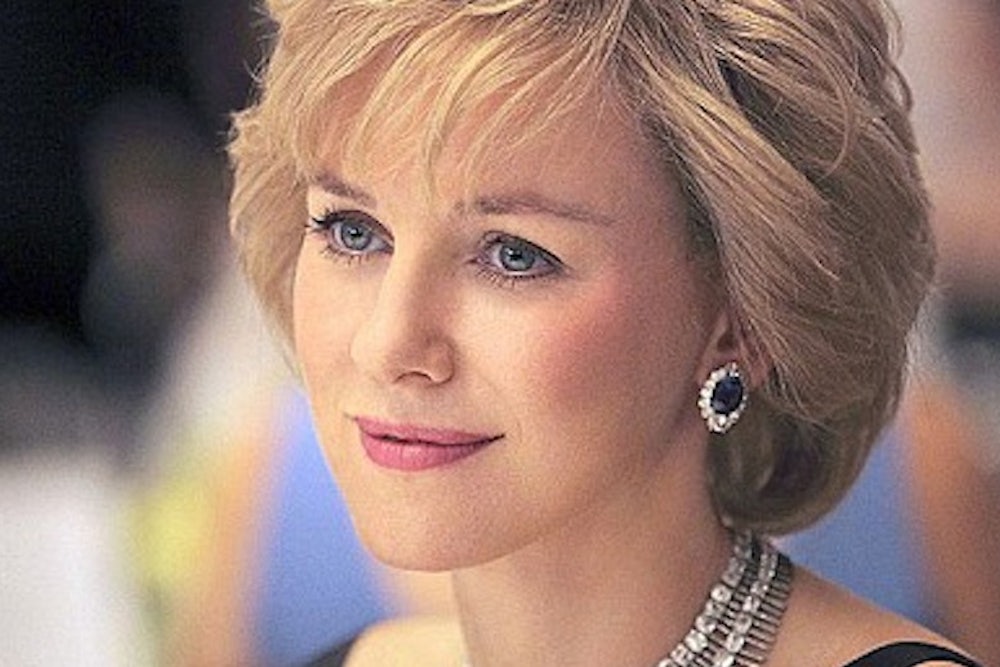The acupuncturist gazes affectionately at Princess Diana (Naomi Watts) while slipping a needle into her client’s toe. “You hang on to the idea of love,” she murmurs. “You’re so good at giving love, so you keep on giving.’’ This vapid nonsense sets the tone for Diana, the new royal bio-pic premiering in U.S. theatres today, which lurches between elegy and soap opera, never arriving at anything more than platitudes about the princess. The film chronicles Diana’s post-divorce romance with Pakistani heart surgeon Hasnat Khan and the paparazzi intrusion that complicates their affair. The sinister Windsors are a shadowy background presence throughout. But the film is so vague, so fuzzily adoring, that it tells us far more about the annoying endurance of the cult of Diana than it does about Diana herself.
There are a few halfhearted attempts at giving the film a binding motif. Khan, a jazz connoisseur, tells Diana, ‘‘Jazz is in the moment, you have to be there, it’s improvised.’’ The idea is that she, in her benevolent, beatific interactions with the public, does just this: ‘‘You look at someone for a clue as to how to start the conversation and you start from there,” Khan says. Diana’s dealings with her subjects are played as near-holy happenings. In the midst of a sea of photographers clawing at her, Diana encounters a blind man in the crowd whom she allows to touch her face, which prompts ecstatic joy from all who witness it, the sound fading out over the lingering scene of benediction.
Naomi Watts has perfected Diana’s tilted head, doe eyes and plummy accent, but nothing could salvage this dialogue. In conversation with confidant and spiritual advisor Oonagh Toffolo, Diana somberly recounts a dream in which she ‘‘fall[s] into darkness.’’ ‘‘Who’s pushing you?’’ Toffolo asks. ‘‘That’s not the point,” she replies. “The point is, will anyone catch me?’’ The meet-cute between Diana and the dashing doctor Khan feels like an awkward romcom, with Diana’s ditziness played for laughs. There are full minutes during which the couple experiences fits of giggles at the mind-bending adorableness of a woman in her mid-thirties who can’t cook pasta, doesn’t understand football, and says things like ‘‘I’m not sure you can actually make hamburgers.’’
Aside from the ludicrous screenplay, what is so odd about Diana is that it could have been written in 1997. It has all the depth and complexity of a feature for Hello! or OK!, in a collector’s edition replete with glossy tabloid photographs. The film is similarly interested in cataloguing the princess’ greatest sartorial hits: the swimsuits she wore on Dodi’s yacht, her glittery frock at a charity fundraiser. Despite the fifteen years that have passed since her death, Diana gives us no distance at all from the gossipy, sentimental view of Diana as, in the mawkish phrasing of the time (and occasionally in her own estimation), ‘‘the people’s princess” and ‘‘the queen of hearts.’’
Part of what is so interesting and infuriating about the British royalty, and those who marry into it, is that they must pantomime being ordinary while also being gifted exceptional circumstances. Take the media frenzy over Prince William’s comment, outside the hospital after the birth of his son: “He's got a good pair of lungs on ’im, that's for sure. He's a big boy, he's quite heavy.’’ He has to do a winning impression of an ordinary, beleaguered father, while also tacitly acknowledging the global fanfare. And then when Kate Middleton, in her blue polka dots, quietly confessed, ‘‘I think any parent will know what this feeling feels like," the same papers that faithfully reported her scrambling social machinations cooed over her normalcy. Attitudes toward royalty in Britain are brutal, fawning, and prurient all at once.
But Diana captures none of that. Instead of a troubled, complicated woman thrust into the role of international icon, this Diana is an otherworldly ingénue. Diana Spencer was engaged to the Prince of Wales when she was nineteen, married a month after she turned twenty, while Charles was thirty-two. She was subject to a pre-wedding inspection by a royally appointed gynecologist to affirm that she was untrammelled for the future King. This kind of institutional severity would be enough to unbalance any teenager, and a script that took into account her darknesses, flaws, and the downright strangeness of the modern monarchy could be fascinating, as it was in Stephen Frears’s The Queen. But instead of interrogating the cult of Diana, this is a weak, airbrushed melodrama that tells us nothing about contemporary royalty at all.
Victoria Beale is a writer based in New York and London.
